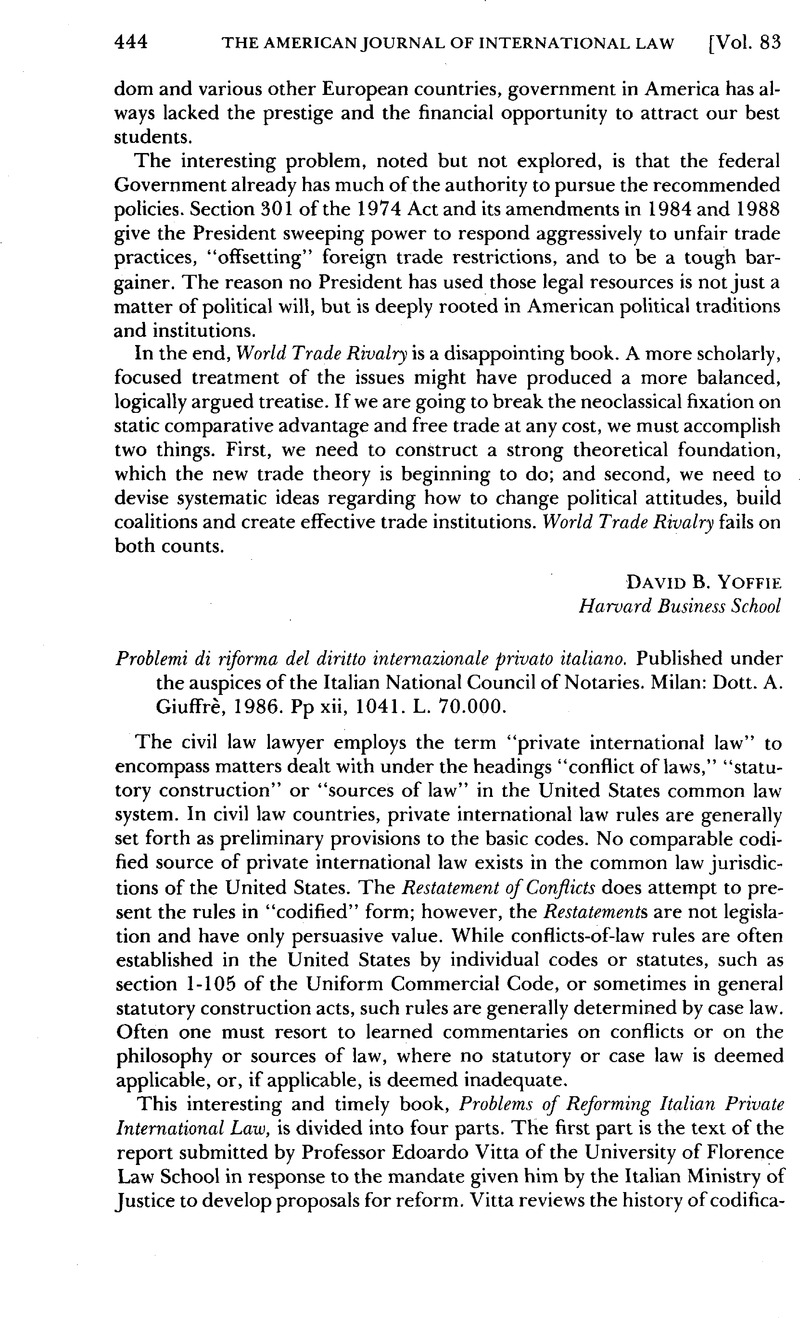No CrossRef data available.
Article contents
Problemi di riforma del diritto internazionale privato italiano. Published under the auspices of the Italian National Council of Notaries. Milan: Dott. A. Giuffrè, 1986. Pp xii, 1041. L. 70.000.
Published online by Cambridge University Press: 27 February 2017
Abstract

- Type
- Book Reviews and Notes
- Information
- Copyright
- Copyright © American Society of International Law 1989
References
1 This convegno was in some respects comparable to meetings of the American Law Institute, with its critical evaluation of the proposed text and subsequent presentation of an amended draft by Vitta in response to the commentary.
2 The duties of a notary in Italy and other civil law countries are entirely different from and far more extensive than those of a notary in the United States, who generally only verifies acknowledgments. The civil law notary draws up legal instruments in property, family, corporate and other areas of the law. In addition, many transactions must be incorporated in notarial deeds in order to be valid. Notaries and lawyers have separate professional organizations in civil law countries. The notaries' professional organizations are frequently involved in law reform activities and are generally extremely influential in public affairs. See P. Herzog, Civil Procedure in France 102–09 (1967); Margadant, The Mexican Notariate, 6 Cal. W. L. Rev. 218 (1970); M. Cappelletti & J. Perillo, Civil Procedure in Italy 65–67 (1965).
3 Formal papers were presented by Edoardo Vitta (Florence), Andrea Giardina (Rome), Alessandro Migliazza (Milan), Francois Rigaux (Louvain), Riccardo Luzzatto (Milan), Franco Mosconi (Pavia), Tito Ballarino (Padua), Alfred A. von Overbeck (Freiburg) and Kurt Siehr (Zurich).
4 “Interventions” were presented by Fritz Schwind (Vienna), Giuseppe Barile (Rome), Vicente L. Simó Santonja (Valencia), Gerardo Broggini (Milan), Paolo Picone (Naples), Giuseppe Sperduti (Rome), Antonio Ruini (Modena), Giorgio Gaja (Florence), Giorgio Badiali (Perugia), Stefania Bariatti (Milan), Fausto Pocar (Milan), Massimo Panebianco (Salerno) and Francesco Capotorti (Rome).
5 These articles deal with the Law of Inheritance and Gifts—Articles 26–32, Property Law—Articles 33–37, Contractual Obligations—Articles 38–48, and Extracontractual Obligations—Articles 49–57.
The current preliminary provisions to the Italian Civil Code contain only one article, dealing with conflict-of-laws rules for “Obligations” (i.e., contracts and torts). This section provides a generic confiict-of-laws rule for contracts in general and another for torts in general (see Art. 25).
Recognition of the increasing complexity of the law is illustrated by the fact that the proposed revision utilizes 19 articles (i.e., 38–57) to deal with conflict-of-laws rules for contracts and torts. For example, separate sections deal with contracts involving real estate, personal property, secured loans, intangibles, insurance, banking, services, independent contractors, labor, consumers, agency, commercial paper and related general rules of interpretation. The torts sections address matters such as conflict-of-laws rules for tort liability in general, product liability, and unfair competition.




